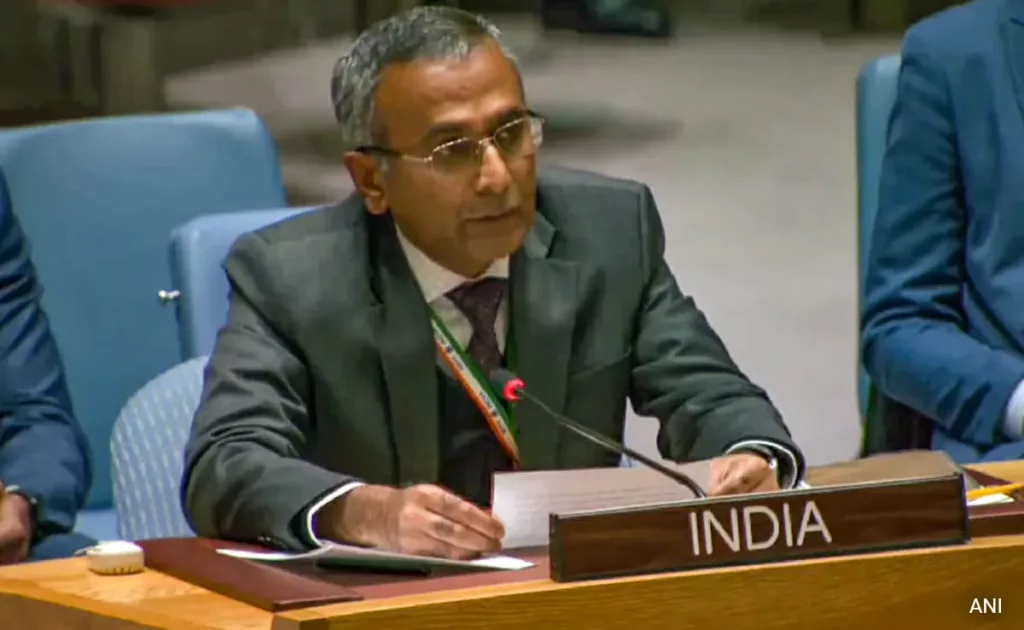While extolling the importance of the Shanghai Cooperation Organisation (SCO) for the region, India has drawn attention to the roles of certain countries that could undermine it.
Without directly naming any country, the references to terrorism were aimed at Pakistan and at the need for respecting territorial integrity to both China and Pakistan in the address to the Security Council on Friday by R. Ravindra, the charge d’affaires of India’s UN Mission.
“Certain countries are using terrorism as an instrument of state policy (and) such an approach has the potential to affect cooperation in multilateral platforms including at the SCO,” he said.
“India has also consistently advocated respect for sovereignty and territorial integrity for connectivity and infrastructure projects,” he said in what is seen as a reference to Chinese projects in Pakistan-occupied Kashmir.
He was speaking at a Council meeting convened by its current president Russia on cooperation between the UN and the regional and sub-regional organisations like the SCO, the Collective Security Treaty Organisation (CSTO), and the Commonwealth of Independent States (CIS) for maintaining international peace and security.
“India accords high priority to the consolidation of trust in the security domain within SCO as well as strengthening ties with SCO partners on the basis of equality, respect, and mutual understanding,” Mr Ravindra said.
“India’s priorities in SCO are shaped by Prime Minister’s (Narendra Modi’s) vision of a ‘SECURE’ SCO, he said, explaining that ‘SECURE’ stands for Security, Economic cooperation, Connectivity, Unity, Respect for sovereignty and territorial integrity, and Environmental protection”.
The Security Council resolutions and targeted sanctions on terrorists and groups must be fully implemented, he said.
“The July 4 SCO summit in Astana, Kazakhstan, said in its declaration that the international community must isolate and expose those countries that harbour terrorists, and condone terrorism,” he said.
Prime Minister Narendra Modi, participating virtually in the summit, had made the case for making combating terrorism an important element of the declaration.
He had told the leaders at the summit, “Let us be clear that if left unchecked, it can become a major threat to regional and global peace”.
US Permanent Representative Linda Thomas-Greenfield, however, took issue with the SCO’s counter-terrorism efforts.
She accused the SCO of repressing “peaceful dissenters” and ethnic and religious minority minorities “under the guise of combating ‘terrorism, separatism and extremism'”.
“I think about the SCO Member States that have prosecuted individuals for speaking out about the importance of regional political autonomy. That have forcibly repatriated asylum seekers fleeing repression in other SCO Member States,” she said.
Thomas-Greenfield said that the regional organisations were “cynically promoting concepts such as ‘dialogue among civilizations’ or ‘civilizational diversity’ in an attempt to justify restrictions on the exercise of human rights and fundamental freedoms”.
The SCO is a ten-member international group focused on Central Asia, which India formally joined in 2015.
Its other members are Russia, China, Pakistan and Iran, the four Central Asian nations, Uzbekistan, Kyrgyzstan, Kazakhstan and Tajikistan, and Russia’s European ally Belarus from further afield that joined this month.
“India shares deep civilizational ties with the people of Central Asia,” Mr Ravindra said.
India has offered a $1 billion Line of Credit for developmental projects in addition to grants for High Impact Community Development Projects (HICDP) for Central Asian countries, he said.
The India-Central Asia Dialogue platform works to strengthen cooperation between India and the Central Asian countries, he added.
He further said that India’s contract to develop the Chabahar Port in Iran “is a testament of our commitment towards realising the potential of the place as a connectivity hub for Afghanistan and Central Asia”, which are landlocked countries.
Russia’s Deputy Foreign Minister Sergey Vershinin, who presided over the meeting, said that the SCO, CIS and CSTO “have achieved significant results, including in boosting integration processes, preventing conflicts and combating terrorism”.
“A constant priority of the SCO is combatting the threats of terrorism, separatism, extremism, drug trafficking and transnational organised crime, especially those emanating from Afghanistan,” he added.
China’s Permanent Representative Fu Cong also touched on the dangers of terrorism, even though Beijing blocks UN sanctions for Pakistan-based terrorists.
“Terrorism, separatism, and extremism are major threats to global security,” he said.
China, he said, wants the UN to work with the SCO to “strengthen dialogue and cooperation in counter-terrorism”.
(Except for the headline, this story has not been edited by NDTV staff and is published from a syndicated feed.)
